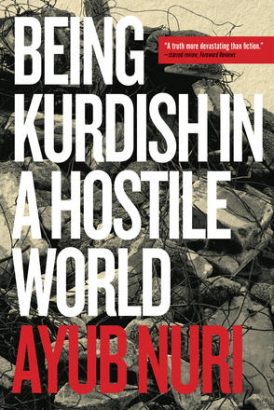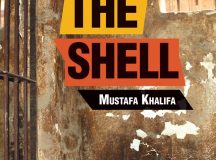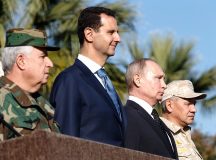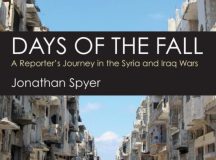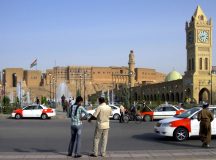Ayub Nuri was born in the wrong place, or so he likes to quip. He comes from Halabja in Iraqi Kurdistan. The origins of that town’s name come from nomads who, according to one popular interpretation, were searching for somewhere else but ended up in Halabja. Upon realising Halabja wasn’t their correct destination they then gave it its name, the literal translation of which is ‘the wrong place’.
Nuri chronicles his childhood and his later journalistic endeavours covering the Iraq War, in this concise but rich memoir, a rare first-hand account of what growing up in Kurdistan was like during Saddam Hussein’s worst atrocities there.
When he was just four-years-old Nuri’s right kneecap was blown off by a stray shell early in the bloody eight-year Iran-Iraq War. He also saw his grandmother suffer an agonizing death following that same gruesome incident.
Nuri’s family had to flee Iran after his father shot at two Iraqi helicopters single-handedly with an assault rifle and miraculously survived. The family subsequently had to flee over the border into Iran to avoid any potential regime retribution. The author’s father was also initially very supportive of Ayatollah Khomeini and became a guerilla for the Islamic Movement of Kurdistan (IMK), who were allowed set up base in the Islamic Republic of Iran. Following Khomeini’s death, however, he grew disillusioned over time with both the movement and Iran.
The book vividly describes the infamous 1988 Halabja gas attack. Later, when the Nuri family returned there, the town was in no-man’s land for a few years after the attack, they were greeted with a very disturbing discovery. Poisonous snakes, that apparently acquired a taste for human flesh from the corpses left there, had infested the town and viciously attacked and even killed some of the returnees.
The family’s return was made possible by amnesty declared in 1990 by Baghdad for Kurds who had left the country for Iran. ‘The man who attacked us with chemical bombs now wanted to forgive us,’ Nuri remarked. ‘But even still, many families registered for amnesty.’
There were three amnesties given in total and the Nuri’s returned on the final one. They, along with most other Kurdish refugees in Iran, had no idea what had happened the first two waves of returnees. Only later did they learn the grisly fate that befell them: ‘the first group had been taken straight from the border and executed and buried in the southern deserts of Iraq, while the second group was taken prisoner and kept for one year in a remote desert near the border with Saudi Arabia, where many died of starvation and disease’.
Following the 1991 Persian Gulf War the Kurds were placed under two crippling embargoes: one from the United Nations, since Kurdistan is part of Iraq, and another from Baghdad, which wanted to cripple Kurdistan’s fledgling autonomy. As a result the region became afflicted by dire food shortages. Nuri tells the story of one of his neighbours, who had a family of six, essentially leaving to the mountains to slowly starve out of sight. In a stroke of unbelievable good luck, however, where he moved his family to coincidentally turned into a smugglers trade route from Iran. He established a storage area near his house and charged the smugglers a small fee to store their goods. Consequently, ‘within a few years he was one of the wealthiest men in the area and he bought big, expensive houses in the provincial capital’. (Nuri credits the UN’s controversial ‘oil for food’ program in the mid-1990s for stopping such widespread hunger, placing blame for the continued direness of the humanitarian situation in the rest of Iraq squarely on Saddam Hussein and his cronies who had control over distribution.)
Nuri perfectly summarises, in just a short few pages, the idiocy of the Kurdish Civil War which took place shortly after the Kurds achieved unprecedented autonomy following the Persian Gulf War. The different dialects which Kurds spoke were used by the warring parties to determine which side of that war they were on. Consequently many Kurds were imprisoned and killed under accusation of being from the rival faction. To avoid the risk of death many Kurds actually had to speak Arabic to move across their own region without challenge.
‘But what a tragic irony!’ Nuri exclaims upon summarizing that point in time. ‘We had been dreaming for years of a free Kurdistan where we could rule ourselves and speak our own language, and now we had to use Arabic to avoid the wrath of our own countrymen.’
The book is consistently frank and honest about some of the unpleasant behaviour of Kurds at points in their history. For example, shortly after the Peshmerga captured Halabja from the regime in 1988, Nuri points out that these fighters refused to let locals who got cold feet out of fear of Baghdad’s retaliation, to leave, assuring them that it was safe to remain there. Many of those innocent Kurds who were forced to stay perished in that infamous attack as a result. He also recalls a Peshmerga member telling him about how, during the aforementioned civil war, ‘one of his comrades who was guarding a checkpoint caught the pregnant wife of a man from a rival party, dragged her out of the car, and beat her with kicks and blows until she couldn’t walk’.
During his first job working as a warehouse manager for a United Nations-funded mine-clearing initiative, Nuri quickly learned that having UN funds sponsoring Kurdish jobs actually gave the Kurds an incentive to ensure that no major progress was made since that would in turn put them out of business. During the seven months I worked with the agency, my team did not remove a single mine,’ he recalled, adding that he ‘couldn’t imagine what those seven months cost the UN.
Another story he heard at the time concerned a local Kurd who joined a UN-funded ‘de-mining agency’ and removed two dozen land mines on his first day. He thought such hard and honest work would surely impress his bosses only to be fired the following day. ‘If everyone worked at that rate, he was told, very soon there would be no mines left in Kurdistan, and the UN’s business would dry up’.
The second half of the book focuses on the Iraq War and while it is not quite the page-turner that that the first part of the book covering his childhood in Kurdistan is, it is full of interesting nuggets. Being a Kurd at that time enabled him to meet with Shiite insurgents fighting the Americans in Najaf (who saw Kurds as fellow victims of the Saddam Hussein’s regime) and Sunni insurgents fighting them in Fallujah (who were satisfied that the Kurds were at least, for the most part, fellow Sunnis).
Nuri is frank about his support for the 2003 war in Iraq and his disdain for the large anti-war protests against it in Western capitals. ‘I hated to see anti-war protests in Western capitals,’ he wrote. ‘The protesters didn’t know anything about our decades of suffering under Saddam’s rule, or how we, the people of Iraq, had made many disastrous attempts to unseat him. Now that we finally had a chance, with American help, to get rid of Saddam, these protesters and “peace lovers” living thousands of miles away in their comfortable cities were against it. I really hoped, as did millions of Iraqis, that George W. Bush wouldn’t change his mind at the last minute.’
Nuri’s coverage of the war began in his homeland. He recalled an early incident in the war in which American Humvees briefly engaged an Iraqi Army position near the Kurdish front-line and then called in an air strike: ‘The Americans didn’t go to claim the destroyed Iraqi posts, but rather stayed at the Kurdish front line. It felt more like a computer game than a battle. On our side everything was calm. US soldiers fired their guns, cameramen filmed, photographers took pictures and reporters took notes, while on the Iraqi side all was hell.’
The book also recounts his experience covering the joint American-Peshmerga campaign against the Ansar al-Islam, an Islamist group that later formed the Islamic State in Iraq (IS), which had seized territory around Halabja. The campaign consisted of US Navy Tomahawk cruise missiles bombarding the militant positions from hundreds of miles away before the Peshmerga advanced to flush them out. The ferociousness and ruthlessness of Ansar al-Islam was demonstrated when a car bomb almost killed Nuri and his group and did kill an Australian cameraman mere metres away from them.
When this young Kurd from Halabja visited one of Saddam Hussein’s palaces in Tikrit, shortly after the regime’s overthrow in 2003, he took some of the dictator’s ashtrays and towels and was stopped by an American soldier at the entrance. Upon protesting that the looters in the area were taking everything from the palace, including large appliances like washing machines with complete impunity, while he just took those small items the soldier simply advised him not to leave out the front entrance. ‘See no evil, hear no evil,’ he was told. ‘Thus,’ Nuri recalled, ‘I got away with my souvenirs, and a new English idiom.’
Nuri clearly doesn’t distort his own history and even writes about having some initial sympathy for the insurgents in light of the Abu Ghraib scandal. Many of Saddam Hussein’s victims hoped the dungeon would be demolished or at least turned into a museum – like the Iraqi regimes infamous Amna Suraka prison in Kurdistan, where many Kurds suffered unmentionable forms of torture. Instead the Americans were seen doing the same thing in the same place as the regime they deposed. However, seeing how the Iraqi insurgents fighting the Americans brutalised ordinary Iraqis, and ignited the sectarian fires that tore apart Iraqi society, his fleeting sympathy was brought to an abrupt end.
Given the fact he was born and grew up in Halabja one would have also liked to see Nuri recall his discomfort at seeing certain US officials visiting the memorial in that town to the infamous gas attack. ’It was, after all, the same Colin Powell, Donald Rumsfeld and their associates who had turned a blind eye to the chemical gas attack on the Kurds in Halabja in 1988, who now visited it in 2003 as the scene of a war crime,’ he wrote in his Open Democracy column at the time, illustrating his distaste at their belated and hypocritical display of sympathy.
Nuri concludes his memoir by arguing that Iraq’s descent into sectarian blood-letting and violence and the rise of IS in 2014 necessitates the creation of an independent Kurdish nation state. The epilogue, a brief essay arguing for Kurdish independence published in the run-up to the September 2017 independence referendum, may already feel dated given the prompt and severe Iraqi backlash to, and subversion of, it. Despite this, it still stands as a concise summary of why the vast majority of Iraqi Kurds want their own independent state.
This memoir is a valuable first-hand account by a Kurd of what life has been like in Iraq for the Kurds. As such it is a rare thing. We need more like it to understand this persecuted and stateless people.

